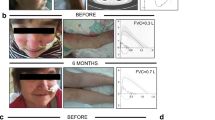Abstract
VEXAS (vacuoles, E1 enzyme, X-linked, autoinflammatory, somatic) syndrome is caused by UBA1 somatic mutations and is characterized by late-onset systemic autoimmune inflammation and blood abnormalities such as cytopenia, vacuolation of myeloid/erythroblastic cells, and myelodysplastic syndrome (MDS). It is often resistant to immunosuppressive therapy, and no treatment strategy has been established. A 65-year-old man presented with palpable erythema, fever, macrocytic anemia, and arthralgia. He was subsequently diagnosed with MDS complicated by Sweet's disease. Treatment with azacitidine was initiated due to suspected skin invasion by MDS cells and resistance of the skin rash to steroid therapy. Next-generation sequencing of bone marrow samples prior to treatment initiation revealed the presence of UBA1 p.M41L (VAF 0.38) and DNMT3A p.L605fs mutations (VAF 0.184). Based on the findings of systemic inflammation, a diagnosis of VEXAS syndrome was made. The fever and skin rash improved with azacitidine therapy. In conclusion, somatic mutations in UBA1 should be explored in patients with MDS exhibiting systemic autoimmune inflammation. Furthermore, azacitidine may be a good treatment option for systemic autoinflammation in MDS associated with VEXAS syndrome.




Similar content being viewed by others
Data availability statement
The data that support the findings of this study are available from the corresponding author upon reasonable request.
References
Beck DB, Ferrada MA, Sikora KA, Ombrello AK, Collins JC, Pei W, Balanda N, et al. Somatic mutations in UBA1 and severe adult-onset autoinflammatory disease. N Engl J Med. 2020;383(27):2628–38.
Huang H, Zhang W, Cai W, Liu J, Wang H, Qin T, et al. VEXAS syndrome in myelodysplastic syndrome with autoimmune disorder. Exp Hematol Oncol. 2021;10(1):23.
Obiorah IE, Beck DB, Wang W, Ombrello A, Ferrada MA, Zhijie Wu, et al. Myelodysplasia and bone marrow manifestations of somatic UBA1 mutated autoinflammatory disease. Blood. 2020;136(Supplement1):20–1.
Grayson PC, Patel BA, Young NS. VEXAS syndrome. Blood. 2021;137(26):3591–4.
Arsène Mékinian, Lin-Pierre Zhao, Kristell Desseaux, Rose Rose, Laurent Pascal, Pierre Peterlin, et al.; A Phase II Study of the Efficacy and Tolerance of Azacitidine (AZA) in Steroid Dependent/Refractory Systemic Autoimmune and Inflammatory Disorders (SAID) Associated with MDS or CMML (GFM- AZA-SAID -trial). Blood 2021;138 (Supplement 1): 3697.
Cordts I, Hecker JS, Gauck D, Park J, Härtl J, Günthner R, et al. Successful treatment with azacitidine in VEXAS syndrome with prominent myofasciitis. Rheumatol (Oxf). 2022;61(5):e117–9.
Raaijmakers MHGP, Hermans M, Aalbers A, Rijken M, Dalm VASH, van Daele P, et al. Azacitidine Treatment for VEXAS Syndrome. Hemasphere. 2021;5(12): e661.
Manzoni M, Bosi A, Fabris S, Lionetti M, Salerio S, Migliorini AC, et al. Clinical, morphological and clonal progression of VEXAS syndrome in the context of myelodysplasia treated with azacitidine. Clin Hematol Int. 2022;4(1–2):52–5.
Genovese G, Kähler AK, Handsaker RE, Lindberg J, Rose SA, Bakhoum SF, et al. Clonal hematopoiesis and blood-cancer risk inferred from blood DNA sequence. N Engl J Med. 2014;371(26):2477–87.
Jaiswal S, Fontanillas P, Flannick J, Manning A, Grauman PV, Mar BG, et al. Age-related clonal hematopoiesis associated with adverse outcomes. N Engl J Med. 2014;371(26):2488–98.
Abplanalp WT, Cremer S, John D, Hoffmann J, Schuhmacher B, Merten M, et al. Clonal hematopoiesis-driver dnmt3a mutations alter immune cells in heart failure. Circ Res. 2021;128(2):216–28.
Lim JY, Duttke SH, Baker TS, Lee J, Gambino KJ, Venturini NJ, et al. DNMT3A haploinsufficiency causes dichotomous DNA methylation defects at enhancers in mature human immune cells. J Exp Med. 2021;218(7): e20202733.
Leoni C, Montagner S, Rinaldi A, Bertoni F, Polletti S, Balestrieri C, et al. Dnmt3a restrains mast cell inflammatory responses. Proc Natl Acad Sci USA. 2017;114(8):E1490–9.
Georgin-Lavialle S, Terrier B, Guedon AF, Heiblig M, Comont T, Lazaro E, et al. Further characterization of clinical and laboratory features in VEXAS syndrome: large-scale analysis of a multicentre case series of 116 French patients. Br J Dermatol. 2022;186(3):564–74.
Liang S, Zhou X, Pan H, Yang Y, Shi L, Wang L. Prognostic value of DNMT3A mutations in myelodysplastic syndromes: a meta-analysis. Hematology. 2019;24(1):613–22.
Mangaonkar AA, Langer KJ, Lasho TL, Finke C, Litzow MR, Hogan WJ, et al. Reduced intensity conditioning allogeneic hematopoietic stem cell transplantation in VEXAS syndrome: Data from a prospective series of patients. Am J Hematol. 2022. https://doi.org/10.1002/ajh.26786.
Sterling D, Duncan ME, Philippidou M, Salisbury JR, Kulasekararaj AG, Basu TN. VEXAS syndrome (vacuoles, E1 enzyme, X-linked, autoinflammatory, somatic) for the dermatologist. J Am Acad Dermatol. 2022;S0190–9622(22):00181–5.
Zakine E, Schell B, Battistella M, Vignon-Pennamen MD, Chasset F, Mahévas T, et al. UBA1 variations in neutrophilic dermatosis skin lesions of patients With VEXAS syndrome. JAMA Dermatol. 2021;157(11):1349–54.
Acknowledgements
This work was supported by the Japan Agency for Medical Research and Development (AMED) (JP19ck0106250h0003 to S.Ogawa.; JP19ck0106353h0003 to Y.N.), the Ministry of Education, Culture, Sports, Science and Technology of Japan; the High Performance Computing Infrastructure System Research Project (hp200138, hp210167 to S.Ogawa.); and KAKENHI (JP18H02836 to Y.N.). This work was supported by MEXT as “Program for Promoting Researches on the Supercomputer Fugaku” (Unravelling origin of cancer and diversity by large-scale data analysis and artificial intelligence technology, JPMXP1020200102) and used computational resources of supercomputer Fugaku provided by the RIKEN Center for Computational Science (Project ID: hp210167).
Author information
Authors and Affiliations
Corresponding author
Ethics declarations
Conflict of interest
The authors declare no competing financial interests.
Additional information
Publisher's Note
Springer Nature remains neutral with regard to jurisdictional claims in published maps and institutional affiliations.
About this article
Cite this article
Kataoka, A., Mizumoto, C., Kanda, J. et al. Successful azacitidine therapy for myelodysplastic syndrome associated with VEXAS syndrome. Int J Hematol 117, 919–924 (2023). https://doi.org/10.1007/s12185-023-03532-y
Received:
Revised:
Accepted:
Published:
Issue Date:
DOI: https://doi.org/10.1007/s12185-023-03532-y




